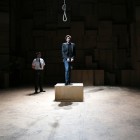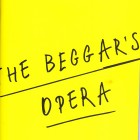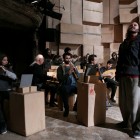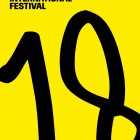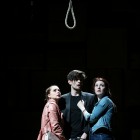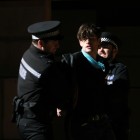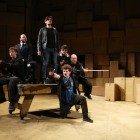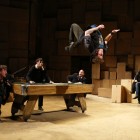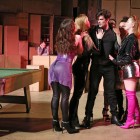Beggar's Opera 2018Théâtre des Bouffes du Nord, Paris
Read more about the opera Beggar's Opera
The operatic offering at the 2018 Edinburgh International Festival consisted of three fully staged productions imported from leading French companies. There were also two concert performances.
In recent years we have heard several of Rossini's less frequently performed operas. Now we could see, together, for the first time here, his two most popular comic masterpieces. Il barbiere di Siviglia was presented by Le Théâtre des Champs-Elysées, on their first visit from Paris and La cenerentola by the familiar and welcome Opéra de Lyon.
In addition, John Gay's Beggar's Opera was performed by the Théâtre des Bouffes du Nord, from Paris, who had a substantial residency at the Festival. That great authority on baroque performance practice, William Christie, had devised the musical side of this multinational coproduction, though no longer present at these performances.
The third instalment of Wagner's Ring, Siegfried was performed in the Usher Hall. Sir Mark Elder conducted the Hallé; the all-star cast included Simon O'Neill (Siegfried), Christine Goerke (Brünnhilde) and Iain Paterson (Wanderer).
The creepy forest theme continued with a concert performance of Humperdinck's Hansel and Gretel, given by the RSNO under Sir Andrew Davis. Elizabeth DeShong (Hansel) and Laura Wilde (Gretel) led the cast.
Two important oratorios were also given in the Usher Hall. The Dunedin Consort performed Handel's mighty Samson and the Festival's opening concert was Haydn's Creation.
Swarming with highwaymen, thieves, jailors, pimps and prostitutes, John Gay's savagely satirical ballad opera depicts a world of greed, crime, poverty and inequality. Politicians and officials are just as corrupt as the lowlifes below them.
The Beggar's Opera was last performed at the Festival when Scottish Opera did it in 1981. A youthful Sir Thomas Allen played Macheath and the cast were almost entirely operatically trained singers. It moved away from the original 'ballad opera' style of the work. The conductor Guy Woolfenden, for years provider of music to the Royal Shakespeare Company, rescored the work on a much larger scale than usual, resulting in an uneasy mix of opera and musical.
This new multinational co-production provided something rather different. The musical side was under the guidance of baroque specialist William Christie - his role described as 'concept and musical direction'. He set it up for a group of ten players from Les Arts Florissants (string quintet plus flute, oboe, percussion, archlute and harpsichord), ensuring it would be on a more appropriately intimate scale. The once familiar melodies - 'Cold and raw', 'Over the hills and far away', 'Greensleeves', 'Lilliburlero' and many others from the folk tradition or by then familiar composers including Purcell, all came over beautifully in these arrangements. In the absence of Christie himself the band was ideally directed from the harpsichord by Florian Carré.
The performing version of the text was in the hands of renowned director Robert Carsen and dramaturg Ian Burton. Their adaptation to transpose the work into a modern setting was generally successful. The original framing satirical dialogues of Beggar and Management were dispensed with, and the happy ending was an even more contrived device than in the original - no problem there, with Macheath saved from the gallows to be appointed as the new Prime Minister. Two small roles with eighteenth century titles - Turnkey and Drawer - were modernised to prison guard and Manuel (a barman), but otherwise the original characters remained. The new additions to the text included a wide range of topical one-liners emphasising contemporary issues. Most of them were predictable, but still amusing. Inevitably the dialogue was liberally laced with a great quantity of undeleted expletives, no longer as shocking as this would have been forty years ago when the Watergate tapes became public knowledge. Indeed, if anything the constant swearing became tedious after a while, as it can do in real life, though only two audience members could be seen walking out from the matinee. Whether a staging originating in Paris needed to emphasis the automatic dislike of 'fucking Brexit' is debatable, but the matinee audience neither cheered nor laughed. Perhaps the less political complaints (plastic fivers?) struck a chord more.
The staging was excellent. The set, a rear wall of packing cases stacked up, for this was Peachum's warehouse, could open to reveal storage cupboards or entrances at ground level, and a large additional playing area above. The first sounds heard were a deafening cacophony of sirens and alarms as a swarm of men ran in to remove some of them. Suddenly, amid all this modernity, the band struck up with a pure eighteenth century sound - a superb contrast, perhaps not made enough of later on.
The performers were generally trained in music theatre, so they could act and dance extremely successfully. They were also accomplished singers, in a non-operatic style. For the most part they were also extremely young, recent graduates of various British colleges. An exception to this, and also a performer with wide operatic experience, was the tenor Robert Burt. Remembered happily from last year's Monteverdi cycle, he is an excellent character actor, and properly dominated the opening scenes as Peachum. Mrs P, and the contrasting part of Mrs Trapes, were projected with oodles of character by a comparative veteran, Beverley Klein. While her career has concentrated on musical theatre, she has worked with opera companies before - she sang the other Mrs Peachum, the Weill version, with Scottish Opera as long ago as 1990. Lockit, the corrupt prison warder, was also well projected by Kraig Thornber
The most prominent roles taken by younger cast members included Benjamin Purkiss (Macheath), Kate Batter (Polly), Olivia Brereton (Lucy) and Sean Lopeman (Filch and Manuel). All did extremely well, putting over a wide range of ballads highly effectively. They were backed up by an excellent team of supporting players who all coped with complete success with the strange hybrid nature of the work.
Performance Cast
- Mr Peachum a 'fence'
- Filch employee of Peachum
- Mrs Peachum
- Polly Peachum Peachum's daughter
- Macheath a highwayman
- Robin of Bagshot of Macheath's gang
- Matt of the MInt of Macheath's gang
- Harry Paddington of Macheath's gang
- Crook-Fingered Jack of Macheath's gang
- Drawer in the tavern
- Lockit the gaoler
- Lucy Lockit Lockit's daughter
- Turnkey
- Mrs Diana Trapes
- Dolly Trull a woman of the town
- Betty Doxy a woman of the town
- Jenny Diver a woman of the town
- Suky Tawdry a woman of the town
- Molly Brazen a woman of the town
Production Cast
- Conductor
- Director
- Designer - Sets
- Designer - Costumes
- Lighting
- Choreography
- Orchestra
- Co-producer
-
Edinburgh International Festival
Les Théâtres de la Ville de Luxembourg
Opéra Royal / Chateau de Versailles Spectacles
Centre Lyrique Clermont-Auvergne
Opéra Royal de Wallonie - Liège
- Sponsor
